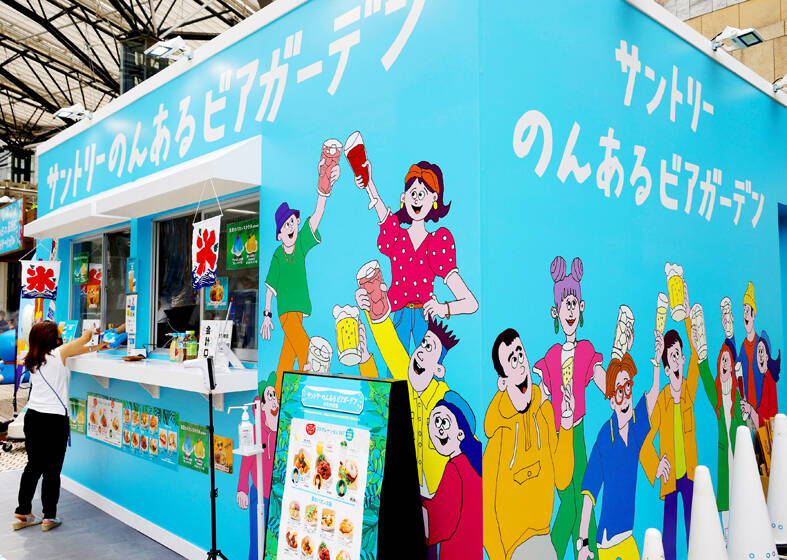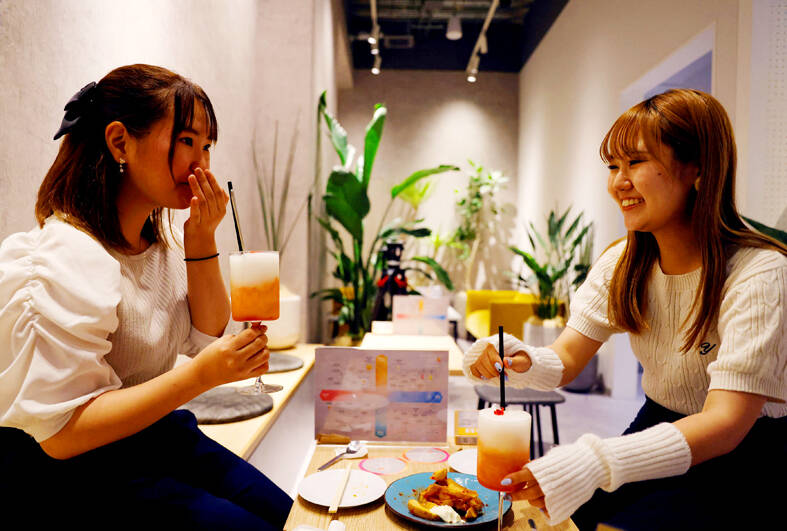Bucking the age-old stereotype of hard-drinking college students, Manaka Okamoto considers the next day’s schedule before cracking open an alcoholic beverage.
“If I have to get up early, and I think: ‘Oh, I should hold off on drinking,’ then I go for a non-alcohol drink to get a sense of alcohol when I’m drinking alone,” Okamoto, 22, said at a Tokyo restaurant. “And of course, when hanging out with friends who don’t drink, it’s nice to have something to toast with.”
The popularity of low and nonalcoholic drinks has risen worldwide, accelerated by the COVID-19 pandemic, which led many people to be more health conscious.

Photo: Reuters
The global market value for the segment rose to just less than US$10 billion last year from US$7.8 billion in 2018, researcher IWSR said.
The effect has been especially pronounced in Japan, where the population is shrinking and younger people drink far less than in previous decades. Just 7.8 percent of Japanese in their 20s were regular drinkers in 2019 compared with 20.3 percent of that age group in 1999, government surveys showed.
Facing a steady decline in revenue from alcohol sales, Japan’s tax office in July launched a contest seeking ideas on how to stimulate demand among younger people.

Photo: Reuters
Japan’s major drinks makers are also looking outside the country for growth. The chief of domestic beer leader Asahi Group Holdings last month said he saw North America as a key market. Suntory Holdings Group is also looking to expand its canned cocktail business there.
At home, the companies are coming up with new ways to improve the bar experience for nondrinkers.
On a recent afternoon in the entertainment district of Roppongi, groups of mostly young women gathered at a no-alcohol “beer garden” set up in the shadow of one of Tokyo’s tallest buildings.
Beer gardens are a summer tradition in Japan, but this one — promoted by Suntory and broadcaster TV Asahi — skipped the beer, offering patrons a lineup of mocktails and alcohol-free wine instead.
“Consumers are not enjoying just alcoholic beverages. We think they value more of the communication that’s generated when drinking or would like to enjoy the atmosphere of the place where they drink,” Suntory general manager Masako Koura said.
Competitor Kirin Holdings also offers nonalcoholic wines, cocktails and beer. The company said sales of its booze-free beer were up more than twofold in the three months through June compared with a year earlier.
Sapporo Holdings said domestic sales of low-alcohol and nonalcoholic beer rose 20 percent in the half year through June, while canned beer sales slid 4 percent.
In Shibuya, the newly opened Sumadori Bar — a play on the Japanese words for “smart drinking” — offers elaborate, sugary cocktails that can be made with no alcohol or up to 3 percent. It offers an environment where everyone can enjoy a drink together, said Mizuho Kajiura, chief executive of the Asahi-led venture.
Kajiura worked for two years in Indonesia and said his experience in the mostly Muslim nation gave him an appreciation for creating hospitable environments for nondrinkers.
“The aim of this bar is to value customers who cannot drink so that they can happily come here with people who do drink,” Kajiura said. “If other restaurants and bars can understand our aim, I think they would get more customers.”

Four people jailed in the landmark Hong Kong national security trial of "47 democrats" accused of conspiracy to commit subversion were freed today after more than four years behind bars, the second group to be released in a month. Among those freed was long-time political and LGBTQ activist Jimmy Sham (岑子杰), who also led one of Hong Kong’s largest pro-democracy groups, the Civil Human Rights Front, which disbanded in 2021. "Let me spend some time with my family," Sham said after arriving at his home in the Kowloon district of Jordan. "I don’t know how to plan ahead because, to me, it feels

The collapse of the Swiss Birch glacier serves as a chilling warning of the escalating dangers faced by communities worldwide living under the shadow of fragile ice, particularly in Asia, experts said. Footage of the collapse on Wednesday showed a huge cloud of ice and rubble hurtling down the mountainside into the hamlet of Blatten. Swiss Development Cooperation disaster risk reduction adviser Ali Neumann said that while the role of climate change in the case of Blatten “still needs to be investigated,” the wider impacts were clear on the cryosphere — the part of the world covered by frozen water. “Climate change and

Poland is set to hold a presidential runoff election today between two candidates offering starkly different visions for the country’s future. The winner would succeed Polish President Andrzej Duda, a conservative who is finishing his second and final term. The outcome would determine whether Poland embraces a nationalist populist trajectory or pivots more fully toward liberal, pro-European policies. An exit poll by Ipsos would be released when polls close today at 9pm local time, with a margin of error of plus or minus 2 percentage points. Final results are expected tomorrow. Whoever wins can be expected to either help or hinder the

DENIAL: Musk said that the ‘New York Times was lying their ass off,’ after it reported he used so much drugs that he developed bladder problems Elon Musk on Saturday denied a report that he used ketamine and other drugs extensively last year on the US presidential campaign trail. The New York Times on Friday reported that the billionaire adviser to US President Donald Trump used so much ketamine, a powerful anesthetic, that he developed bladder problems. The newspaper said the world’s richest person also took ecstasy and mushrooms, and traveled with a pill box last year, adding that it was not known whether Musk also took drugs while heading the so-called US Department of Government Efficiency (DOGE) after Trump took power in January. In a